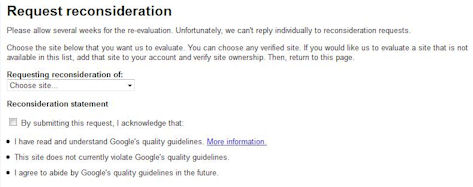
Key Interview Points
I am going to keep the summary of the key points short in today’s interview. Tiffany’s responses bring new clarity to the reconsideration request process. Here is what Matt Cutts Tweeted about the interview:
 |
Read on and enjoy!
Interview Transcript
Eric Enge: Thanks for taking the time to address our questions!
Tiffany Oberoi: Sure! I know that reconsideration requests can be stressful. We want to do our best to clear up any misconceptions about the process.
Eric Enge: The reconsideration request process is an incredibly important tool for those whose sites have been impacted by a penalty.
Let’s start by understanding a bit better the types of penalties. The most extreme penalty is banning of a site from the index. I usually think of this as something you can recognize by search on the site brand name or domain name and not getting the site to show in the results, or where a site: query shows no results. If you can tell me, are there other types of manual penalties that may be assessed?
Tiffany Oberoi: We do have a few different manual actions that we can take, depending on the type of spam violation. We would tend to handle a good site with one bad element differently from egregious webspam. For example, a site with obvious blackhat techniques might be removed completely from our index, while a site with less severe violations of our quality guidelines might just be demoted. Instead of doing a brand name search, I’d suggest a site: query on the domain as a sure way to tell if the site is in our index. But remember that there can be many other reasons for a site not being indexed, so not showing up isn’t an indication of a webspam issue.
Eric Enge: The other major type of penalty is an algorithmic penalty. The algorithms make some determination of problem behavior and adjust the rankings in some fashion. Is that a reasonable short description?
We try to take an algorithmic approach to tackling spam whenever possible
Tiffany Oberoi: Spam algorithms are essentially computer programs that engineers have written to classify webspam. We try to take an algorithmic approach to tackle spam whenever possible because it’s more scalable to let our computers scour the Internet, fighting spam for us! Our rankings can automatically adjust based on what the algorithms find, so we can also react to new spam faster.
And just to be clear, we don’t really think of spam algorithms as “penalties” — Google’s rankings are the result of many algorithms working together to deliver the most relevant results for a particular query and spam algorithms are just a part of that system. In general, when we talk about “penalties” or, more precisely, “manual spam actions”, we are referring to cases where our manual spam team stepped in and took action on a site.
Eric Enge: Do reconsideration requests have any value in the case of algorithmic penalties? Or are they only valid for manual penalties?
If a site is affected by an algorithmic change, submitting a reconsideration request will not have an impact
Tiffany Oberoi: If a site is affected by an algorithmic change, submitting a reconsideration request will not have an impact. However, webmasters don’t generally know if it’s an algorithmic or manual action, so the most important thing is to clean up the spam violation and submit a reconsideration request to be sure. As we crawl and reindex the web, our spam classifiers reevaluate sites that have changed. Typically, some time after a spam site has been cleaned up, an algorithm will reprocess the site (even without a reconsideration request) and it would no longer be flagged as spam.
Eric Enge: As a related question, is a reconsideration request helpful after addressing possible Panda issues?
Tiffany Oberoi: Panda is an algorithmic ranking change targeted at promoting high-quality sites over low-quality sites. Because reconsideration requests will not change the way an algorithm sees your site, a reconsideration request won’t help in this case. We recommend focusing your efforts on improving your site so that it will be classified as high quality in the next Panda update. Amit Singhal had some great tips for how to improve your site in this post from Google’s Webmaster Central Blog.
Eric Enge: Does it ever happen that a reconsideration request get accepted, but then the same penalty gets applied again (perhaps after a subsequent crawl)?
Tiffany Oberoi: This is definitely possible if the bad behavior comes back. For example, we see sites getting hacked repeatedly. The webmaster cleans up the hacked pages but doesn’t close the security hole. They might even submit a successful reconsideration request, but if the security hole is still open it is likely to be exploited again.
Eric Enge: Is there a potential downside to making a reconsideration request for sites when they are not entirely sure if they’ve been penalized? In other words, other issues are discovered in the process?
Tiffany Oberoi: While in theory, it’s possible that spam could be uncovered while processing a reconsideration request, that’s not the goal. The people reviewing a reconsideration request are first and foremost interested in whether the violation of our quality guidelines has been fixed. I wouldn’t let this stop you from submitting a request if you think there is a chance that your site had a violation. But before submitting a reconsideration request, I do recommend a detailed review to make sure your site does not violate any of Google’s webmaster guidelines.
Eric Enge: What would you recommend the structure of a reconsideration request look like? In other words, what major issues should it address? Are there things to avoid?
Tiffany Oberoi: Here are a few tips:
- Be specific. Carefully review Google’s webmaster guidelines and tell us what issues you found on your site and how you fixed them.
- Avoid hiding information. This is the time to address the issues head-on. For example, a reconsideration request that says, “My sites adheres to the guidelines.” is not as useful as one that says, “I had some hidden text at the bottom of my homepage, but I have removed it now.” The second example makes it clear what the initial problem was and what has changed. The more detail you can provide, the better. It helps us assess the situation more fully.
- We want to be assured that we aren’t going to see these spammy techniques again. It’s helpful if you can include details about the steps you’ve taken to prevent it from happening again, policy changes, etc. The people who review these requests want to be confident that the spam techniques have been removed and are not likely to return.
- Don’t mention how much you spend on ads. The team that handles reconsideration requests only cares about search quality. It’s irrelevant and doesn’t help your case to mention buying ads or being a partner or customer of other products.
- We get a lot of reconsideration requests from webmasters that are not even affected by a spam issue, so my other advice is to explore other possible issues as well. For example, check Webmaster Tools for crawl errors. Make sure your robots.txt isn’t blocking Googlebot from accessing your site. Here’s an article with a detailed discussion of other possible ranking problems.
Eric Enge: Should the person submitting the request expect to get a response? Does Google ever provide explicit feedback on the problem(s) found?
… we are currently running an experiment to provide more specific information about the outcome of the request.
Tiffany Oberoi: We generally send a message to Webmaster Tools after the request is received and again after the request has been processed. In the past, we’ve gotten a lot of feedback from webmasters who want to know what happened after we processed the request. We listened to that feedback and we are currently running an experiment to provide more specific information about the outcome of the request.
For example, in some cases, we can communicate back to the webmaster that we were able to revoke a manual action based on their reconsideration request. Or sometimes we let them know that their site is still in violation of our guidelines. This might be a discouraging thing to hear, but it helps webmasters diagnose what’s going on if they know that there actually is a spam issue.
In the majority of cases, we’re able to let the webmaster know that they aren’t affected by any manual spam action at all. This allows the webmaster to focus their attention on other areas instead of submitting multiple reconsideration requests and wondering why they aren’t seeing results.
Eric Enge: If the person submitting the request does not hear anything and nothing changes, should they resubmit?
We do send a confirmation after we receive your request, so as long as you got that message then your request is in the queue to be reviewed.
Tiffany Oberoi: You generally don’t need to resubmit. It can take us days to weeks to process requests, and then more time for changes to go into effect, especially if we need to recrawl and reprocess your site. We do send a confirmation after we receive your request, so as long as you got that message then your request is in the queue to be reviewed.
I don’t recommend sending multiple reconsideration requests in a very short period of time or submitting reconsideration requests for tons of sites all at once rather than one site at a time. We can take that as a sign of bad faith. But if you haven’t received a follow-up message saying that your request has been processed after 2-3 months, it would be reasonable to submit another request at that point.
Over time, the reconsideration request process has improved substantially. We’ve made a lot of progress on making our assessments and the entire reconsideration review process more transparent. I’m excited that most webmasters can find out whether their site has been affected by a manual action, and that they’ll know the outcome of the reconsideration review.
About Tiffany
Tiffany is a software engineer on Google’s Search Quality team. She joined Google in 2006 and focuses on webspam issues and webmaster communication. Prior to joining Google, she worked as a software engineer at Computer Associates and a high school math/engineering teacher in Harlem, New York. She earned her bachelor’s degree in Computer Science from the University of Virginia.
Other Recent Interviews
Mona Elesseily, July 18, 2011
Vanessa Fox, July 12, 2011
Jim Sterne, July 5, 2011
Stephan Spencer, June 20, 2011
SEO by the Sea’s Bill Slawski, June 7, 2011
Elastic Path’s Linda Bustos, June 1, 2011
SEOmoz’ Rand Fishkin, May 23, 2011
Bing’s Stefan Weitz, May 16, 2011
Matt Mickiewicz, January 8, 2011
ex-Googler Adam Lewis, October 10, 2010
Bing’s Mikko Ollila, June 27, 2010
Yahoo’s Shashi Seth, June 20, 2010
Google’s Carter Maslan, May 6, 2010
Google’s Frederick Vallaeys, April 27, 2010
InfoGroup’s Pankaj Mathur, April 5, 2010
Matt Cutts, March 14, 2010
